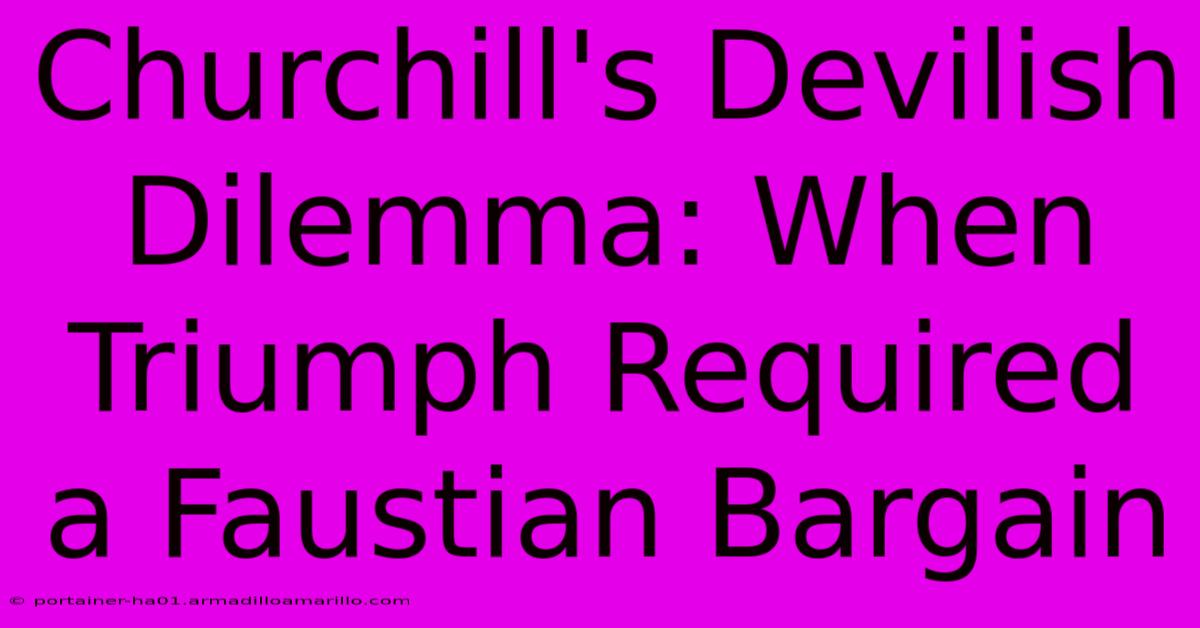Churchill's Devilish Dilemma: When Triumph Required A Faustian Bargain

Table of Contents
Churchill's Devilish Dilemma: When Triumph Required a Faustian Bargain
Winston Churchill, a titan of the 20th century, stands as a figure both revered and scrutinized. His leadership during World War II secured a pivotal Allied victory, yet his legacy is interwoven with morally ambiguous decisions born from the brutal exigencies of war. This essay delves into one such dilemma: the Faustian bargain Churchill seemed to strike, sacrificing certain ethical considerations for the ultimate goal of defeating Nazi Germany. This "devilish dilemma" forces a re-evaluation of his wartime leadership, questioning whether the ends truly justified the means.
The Necessary Evil: Compromises for Victory
Churchill's leadership was characterized by unwavering resolve and a pragmatic approach to achieving victory. This pragmatism, however, sometimes led him down ethically questionable paths. One significant example lies in his approach to the Soviet Union. While recognizing Stalin's totalitarian regime and its inherent brutality, Churchill understood the crucial role the Red Army played in defeating Hitler. This necessitated a precarious alliance, requiring him to tolerate Stalin's actions, even when those actions violated deeply held principles of democracy and human rights.
The Morality of Pragmatism
This strategic alliance presented Churchill with a constant ethical tightrope walk. He was forced to overlook Soviet atrocities, including the mass murders and deportations of civilians, to maintain the crucial wartime partnership. This silence, however, was not without its critics, both during and after the war. Historians continue to debate the extent to which Churchill could – or should – have publicly condemned Stalin's actions without jeopardizing the war effort. The question remains: Was the price of Allied victory – the tacit acceptance of Soviet brutality – too high?
The Bengal Famine: A Stain on Triumph
Another deeply troubling aspect of Churchill's legacy is his handling of the Bengal famine of 1943. Millions perished due to widespread starvation, a crisis exacerbated by wartime policies and the British government's perceived lack of response. Churchill, prioritizing the needs of the war effort, allegedly diverted resources away from India, even allegedly making callous remarks about the suffering of the Indian population.
A Question of Priorities
Critics argue that Churchill's response (or lack thereof) to the Bengal famine reveals a disturbing indifference to the plight of colonial subjects. The famine's devastating impact continues to cast a shadow on his legacy, raising questions about his priorities and the ethical implications of his actions during a time of global conflict. Was the prioritization of the war effort at the expense of millions of lives a justifiable decision? Was his apparent disregard for Indian lives a reflection of ingrained colonial attitudes?
The Devil's Bargain: Assessing the Legacy
Churchill's wartime leadership was undeniably crucial to the Allied victory. However, his decisions, often born from the pressures and complexities of global conflict, force us to confront uncomfortable truths. His pragmatic approach, while effective in achieving the ultimate goal of defeating Nazi Germany, came at a significant ethical cost.
The Weight of History
The question of whether Churchill's "devilish dilemma" was justified remains a subject of intense historical debate. His legacy is complex and multifaceted, requiring a nuanced understanding of the historical context and the moral compromises inherent in wartime leadership. The challenge for historians and the public alike lies in grappling with the contradictory aspects of his character – the visionary leader and the pragmatic politician who made difficult choices with far-reaching consequences. Churchill's story stands as a stark reminder of the intricate moral considerations involved in leadership during times of immense crisis.
Keywords: Winston Churchill, World War II, Soviet Union, Bengal Famine, Faustian Bargain, ethical dilemmas, wartime leadership, moral compromises, historical analysis, pragmatic leadership, Allied victory, Stalin, Nazi Germany, colonialism, human rights.

Thank you for visiting our website wich cover about Churchill's Devilish Dilemma: When Triumph Required A Faustian Bargain. We hope the information provided has been useful to you. Feel free to contact us if you have any questions or need further assistance. See you next time and dont miss to bookmark.
Featured Posts
-
Say Goodbye To Print Disasters Master Swifts Pdf Perfection
Feb 07, 2025
-
Revealed The Secret Formula To Predicting Dayton Vs Nevada Like A Pro
Feb 07, 2025
-
Unveiled The Game Changing Dayton Vs Nevada Prediction You Cant Ignore
Feb 07, 2025
-
Unveiled The 9 Mail Hosting Titans Dominating The Future In 2024
Feb 07, 2025
-
A Path To Purpose Unlocking The Essence Of Christian Identity
Feb 07, 2025
